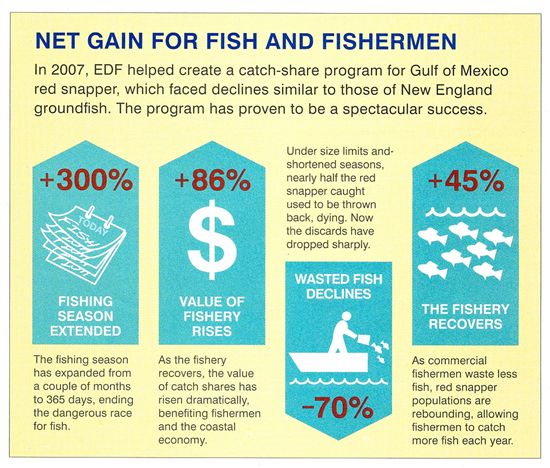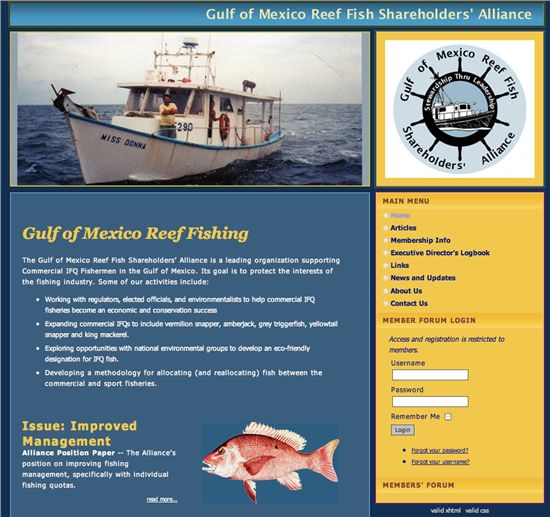Purpose
- Explores and develops market-based solutions.
Summary
Many stocks in the Gulf of Mexico's reef fish fishery (including red snapper, grouper, amberjack, grey triggerfish, yellowtail and vermilion snapper) are in trouble, with some classified as overfished. EDF and Gulf fishermen helped design and implement a new market-based management program of catch shares, called individual fishing quotas (IFQs), which was implemented for commercial red snapper in January 2007. The IFQ program has shown significant and immediate ecological and economic benefits. As a result of this success and the efforts of EDF and allies, a new IFQ program will be implemented in January 2010 for several valuable commercial grouper and tilefish species. However, other species in the complex are in need of similar reforms, and until all reef fish are managed under IFQs, needless bycatch and economic waste will impede the full conservation and business benefits that market-based management offer. EDF is working to bring IFQs to the full Gulf reef fish complex.

Description
With the support of a grant from the Alex C. Walker Foundation, EDF continues to encourage and support fishermen who provide the leadership to advance catch shares, and we are partnering with the newly-created Gulf of Mexico Reef Fish Shareholder's Alliance [the Alliance], which seeks to protect and expand Gulf reef fish catch shares and has tremendous potential as a model. The Alliance is working to expand catch shares to all commercial reef fisheries and to engage the seafood industry in demanding high quality, sustainably caught fish managed under catch shares and has now launched a website (http://shareholdersalliance.org/) .
Final Report, April 2010
Thanks to the generous support of the Walker Foundation, Environmental Defense Fund (EDF) helped long-time fishing allies in the Gulf of Mexico form the nation’s first industry association dedicated to promoting market-based fishery management approaches. The Gulf of Mexico Reef Fish Shareholders’ Alliance [the Alliance] was created in May 2008 to work cooperatively with regulators, environmentalists, universities, and coastal communities to protect the interests of fishermen and to help individual fishing quota (IFQ) fisheries in the Gulf become an economic and conservation success. The Alliance began full-time operations with an executive director in January 2009, and has since been working effectively to meet its shared goals.
Founding members of the Alliance were instrumental in establishing the region’s first catch share program in 2007, an IFQ for the commercial red snapper fishery. Scientists recently concluded that the red snapper population, though not recovered, is showing signs of a comeback after decades of decline. As a result, fishermen are being rewarded for their conservation success with a 40 percent increase in their catch in 2010. At the same time, IFQs have helped fishermen improve and stabilize dockside prices, reduce the costs to harvest fish, and provide higher quality fish to consumers. These improvements have led to an impressive growth in value of $60 million since the implementation of IFQs. While there is still a lot of work ahead to fully rebuild the red snapper stock, this is tremendous progress for fisheries management, fishermen, local communities and the marine environment.
Building on the success of the red snapper IFQ, an advisory panel was established by the Gulf of Mexico Fishery Management Council in 2009 to explore extending the IFQ program to additional Gulf reef fish species. As of January 2010, 18 species were added, and the Gulf Council is now working to incorporate the remaining commercial reef fish into the program.
In addition, the Alliance and its partners are studying the thorny problem of bycatch in the reef fish fisheries, and it is working with EDF and the Gulf Council to explore ways to expand catch shares management to include recreational fishermen. Through a partnership with several environmental organizations and public aquariums, the Alliance is also seeking new avenues for marketing high value, wild caught fish from the Gulf’s sustainably managed catch share fisheries.
This report describes the progress made toward extending IFQ management to other commercial reef fish species, protecting and increasing the benefits of IFQs, and obtaining eco-friendly market designation for IFQ fish.
Extending the IFQ to other reef fish stocks
Building on the success of the commercial red snapper IFQ, the program has been expanded to include 18 additional reef fish (groupers and tilefishes) to further reduce ecological damages and improve the economic performance of the Gulf of Mexico’s reef fish industry. Following an overwhelming approval of the catch share program by fishermen, the Gulf Council approved the expansion with a strong 13-4 vote, and implementation began on January 1, 2010. Fishermen are enthusiastic about the smooth transition to the new program, and the Gulf Council established a new advisory panel to explore extending the IFQ to the remainder of commercial Gulf reef fish (vermilion snapper, amberjack, king mackerel, and others). Some of the key challenges ahead will include establishing science-based catch limits and setting allocations between the commercial and recreational sectors.
The Gulf’s successful experience with catch shares is also helping spur adoption of catch shares in other U.S. fisheries. Alliance members have been invited to share their experiences with regulators, elected officials, fishermen, environmentalists and others at more than 10 events with fishermen from the west coast to the east coast.
Maintain and increase the benefits of IFQs
After just three years of operation, the commercial red snapper IFQ program is already beginning to achieve its goals. National Marine Fisheries Service (NMFS) scientists recently concluded that the snapper population, though not recovered, is showing signs of a comeback after decades of decline. As a result of this conservation success, fishermen have been rewarded with a 40 percent increase in their catch in 2010 (from 2.5 to 3.5 million pounds). At the same time, IFQs have helped fishermen improve and stabilize dockside prices by 30 percent, reduce the costs to harvest fish, and provide higher quality fish to consumers. As a result, the total value of the fishery has increased dramatically from under $10 million prior to IFQs (2006) to about $70 million today.
One reason the stock is rebuilding is that under the IFQ, the commercial red snapper fishery has been able to cut wasteful discarding, killing far fewer fish than under the previous derby management system. To better understand, document, and further reduce bycatch in the reef fish fisheries, the Alliance recently secured a “cooperative research grant” to work with the National Marine Fisheries Service and Texas Tech University.
Now, the biggest remaining threat to the success of IFQs in the reef fish fisheries is the continued overfishing and failing management of the recreational sector. Sportsmen continue to overharvest their catch limit each year by 40 percent or more. One of their goals is to reallocate fish from commercial IFQ fisheries to the recreational sector. Yet, to successfully restore the red snapper fishery to health, all fishermen must become accountable.
Like commercial fisheries, IFQs can help for-hire fishermen reduce waste discards and accurately account for their fish, while improving access to fishing throughout the year. EDF and the Alliance are working to promote these new strategies through Council processes, encouraging leaders from the for-hire sector to help design and advocate for new management approaches.
Eco-friendly designation for IFQ red snapper
EDF is partnering with the Alliance, the World Wildlife Fund, the Sustainable Fishery Partnership and the Ocean Conservancy to promote marketing of red snapper sustainably harvested under the Gulf IFQ plan. The Alliance is conducting a series of “seafood summits” to reach retailers, chefs, and seafood distributors. To date, these have been held at the Shedd Aquarium in Chicago, the New England Aquarium in Boston, and SeaWorld in Orlando. The purpose of the summits is to introduce the Alliance, and the high quality, eco-friendly fish its members catch, to influential seafood buyers (including chefs, purveyors and distributors), and to solicit input from them on their current purchasing of Gulf red snapper, their views on seafood sustainability, and other factors affecting their purchasing decisions. The long-term goal is to place red snapper and other fish from the Gulf IFQ program into high value markets.
EDF is also working with the Alliance and with other environmentalists to find other opportunities to promote Gulf red snapper – while seeking to remove the fish from environmentalists’ “fish-to-avoid” lists on which it remains since it is still classified as “overfished.” The Alliance has initiated a pre-certification process with the Marine Stewardship Council (MSC) and is establishing quality control guidelines with the assistance of the MSC staff to help advance red snapper toward certification. The Alliance is also working with Sustainable Fishery Partnership and others to develop a “traceability” pilot program to ensure a chain of custody from the boat to the end user to ensure the highest quality of fresh, wild caught American red snapper.
Conclusion
EDF is working with its partners to bring all Gulf reef fish under IFQ management by 2012, and to integrate management for the commercial and recreational sectors. Until all reef fish are managed under IFQs, needless bycatch and economic waste will impede the full conservation and business benefits that catch share management offers. Final Financial Report
Personnel (includes benefits) $569,297
Consultants 562,167
Travel 76,691
Regional Meetings 26,947
Grants & Passthroughs 161,475
Printing/Supplies/Media 96,781
EDF Indirect Costs @ 16% 170,789
Total project expenses: $1,664,147

Shareholder's Alliance Sample Web Page. Web address: http://shareholdersalliance.org/
Purpose
Market-based fisheries management makes it possible to protect the environment, increase opportunities for industry profits, provide higher quality fish, create more full-time jobs, and save lives. With catch share management, which provides fishermen with an economic incentive to conserve fisheries and oceans, the Gulf of Mexico reef fish fisheries can gain these benefits. EDF seeks to boost efforts to secure a catch share, called individual fishing quotas (IFQs), for the reef fish complex by supporting the efforts of the nascent Gulf of Mexico Reef Fish Shareholders’ Alliance.
Scope
Many of America's fisheries suffer under poor management that has led to numerous overfished stocks. The opportunity to transform the nation’s fisheries into well managed, market-based catch share systems is now at hand. Enthusiasm for catch share programs is mounting among fishermen and managers; the required legislative framework is in place. Environmental Defense Fund is working with fishermen in the Gulf of Mexico reef fish fisheries, the South Atlantic snapper grouper fishery, the New England groundfish fishery, and the Pacific groundfish fishery to unlock the potential of catch shares and move those fisheries away from a tragedy of the commons towards a sustainably managed asset. Building on the success of the new catch share for Gulf commercial red snapper (and expectations for the grouper fishery) by securing catch shares for other species in the Gulf reef fish complex, EDF will help advance catch shares throughout the country.
Amount Approved$25,000.00
on 6/24/2009
(Check sent: 7/24/2009)